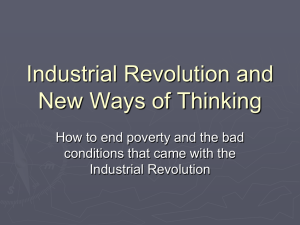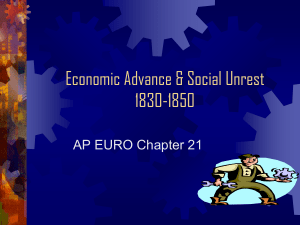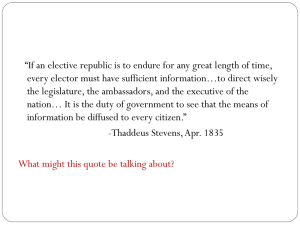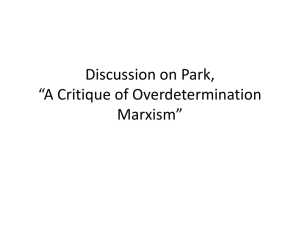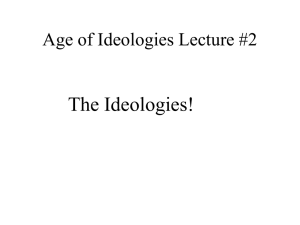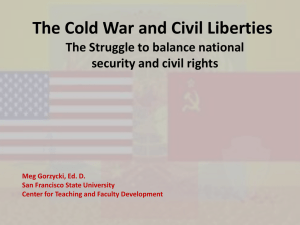PowerPoint Presentation - Leavenworth High School
advertisement
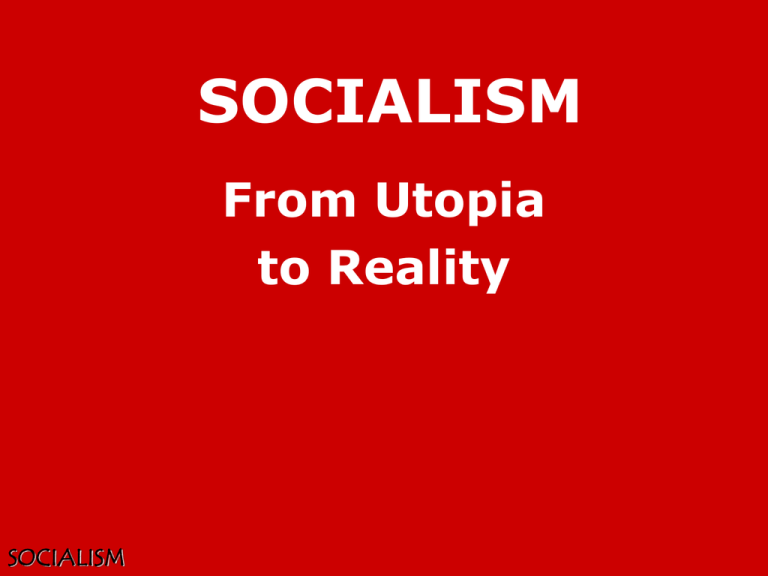
SOCIALISM From Utopia to Reality SOCIALISM Definition •Advocating public ownership of means of production, with work and products shared SOCIALISM Ideology •Wealth was concentrated in few hands •Working class was deprived of what was rightfully theirs •Social mechanism had to be developed to justly distribute society's wealth SOCIALISM UTOPIAN SOCIALISM Robert Owen Count de SaintSimon Charles Fourier Louis Blanc SOCIALISM Antediluvian Socialism •Before the flood of revolutions of 1848 •1815 to 1848 SOCIALISM Ideology • Endorsed productive capacity of industrialism • Denounced its mismanagement • Organized society as community, not competing individuals –End ruthless, capitalist individualism SOCIALISM Ideology • Society regarded its ideas as too idealistic with little practical application –Little political or social support • Failure of 1848-49 revolutions discredited Utopian Socialists SOCIALISM Robert Owen • 1771-1858 • England/Scotland • One of the first socialists and one of the first cotton lords • Became crusader for social reform SOCIALISM Robert Owen • Created model community for employees-New Lanark, Scot. –Paid high wages –Reduced working hours –Built schools, housing, & stores • Established New Harmony in Indiana (1825-1830) SOCIALISM Count de Saint-Simon •1760-1825 •France •Social hierarchy based on productivity •Among first exponents of planned society SOCIALISM Count de Saint-Simon •Advocated public ownership of industrial equipment & other capital –Captains of industry would be in control –Captains plan and coordinate labor and resources of society SOCIALISM Charles Fourier • 1772-1837 • France • Dreamer (Schemer??) • Proposed that society be organized in small units (phalansteries) SOCIALISM Charles Fourier • Determined there were 810 distinct personality types • Phalanstery would contain 1,620 people (1 male/1 female each) • Each person would do the work suited to his/her natural inclination so crime would end SOCIALISM Louis Blanc • 1811-1882 • France • Journalist • Organization of Work (1830) one of the most constructive of early socialist writings SOCIALISM Louis Blanc • Proposed system of “social workshops” (state-supported manufacturing centers) –Workers work for themselves –No intervention of capitalists • Believed government should guarantee workers a job SOCIALISM CHRISTIAN SOCIALISM Charles Kingsley SOCIALISM Short-lived •1848-1890s •England SOCIALISM Ideology •Industrial evils could be ended by following Christian principles •Tried to bridge gap between anti-religious drift of socialism and need for Christian social justice SOCIALISM Charles Kingsley • 1814-1875 • Best-known proponent • His writings exposed social evils of industrialism SOCIALISM SCIENTIFIC SOCIALISM Karl Marx SOCIALISM Ideology • Created by Marx as primary ideology of protest & revolution • Communist philosophic system –Founded on inherent goodness of man –Rousseau-influenced position SOCIALISM Ideology • Men are corrupted by artificial institutions (states, churches, etc.) • History of humanity is history of class struggle (economics) SOCIALISM Ideology •The age of bourgeois domination of working class (proletariat) –Most severe and oppressive phase of struggle –Would lead to its own destruction SOCIALISM Ideology • The proletariat: –Needed to be educated –Would lead violent revolution & destroy institutions that perpetuate struggle & suppression of majority –Dictatorship of the proletariat would then occur SOCIALISM Ideology • Theory of Surplus Labor –True value of product was labor –Worker received small amount –Capitalist "stole" surplus labor (difference in price and workers’ pay) SOCIALISM Ideology •Dialectic Materialism –Hegel's dialectic was idea –Marxian dialectic was action –Driven by dynamics of materialism with classless society as synthesis SOCIALISM Karl Marx • 1818-1883 • German philosopher • Lived most of his adult life in London • Born to Jewish lawyer who had converted to Christianity SOCIALISM Karl Marx • Atheistic Marx studied philosophy at Univ. of Berlin before turning to journalism & economics –Read widely in French socialist thought –Shared many of Fourier’s views on marriage SOCIALISM Karl Marx •Wrote: –The Communist Manifesto (1848) –Critique of Political Economy (1859) –Das Kapital (1863-1864) SOCIALISM Karl Marx • His arguments –Put forth in scientific form –From extensive, accumulated data –Developed in persuasive rhetorical style SOCIALISM ANARCHISM William Godwin Auguste Blanqui Pierre Proudhon Michael Bakunin SOCIALISM Definition • Situation where there would be no property or authority • Attained through enlightened individualism • Emerged in early 19th century as consequence of Ind. Rev. SOCIALISM William Godwin • 1756-1836 • England • Married to Mary Wollstonecraft • Although once a minister, he became an atheist SOCIALISM William Godwin • Wrote The Enquiry Concerning Political Justice (1793) –Best-known work –Expounded his theories of philosophical anarchism SOCIALISM William Godwin • Convinced of –The individual perfection of human beings –Human being’s ability to reason • Found all forms of control from without unreasonable SOCIALISM Auguste Blanqui • 1805-1881 • France • Advocated terrorism to end capitalism and the state • Revolution achieved only with small cell of men leading it SOCIALISM Pierre Proudhon • 1809-1865 • France • Attacked principle of private property because it denied justice to common people SOCIALISM Pierre Proudhon •Wrote What is Property? (1840) •Stated that: –Change achieved through education –No violence necessary SOCIALISM Michael Bakunin • 1814-1876 • Russia • Violent, terrorist actions were necessary to move people to revolt against their oppressors SOCIALISM SYNDICALISM Georges Sorel SOCIALISM Ideology •Variation of anarchism –Anarcho-syndicalism •Direct economic actions to control industries •Strike & industrial sabotage frequently used by syndicalists SOCIALISM Georges Sorel • 1847-1922 • France • Supported Alfred Dreyfus –Accused of anarchism and convicted of treason • Influenced young Mussolini SOCIALISM REVISIONIST SOCIALISM Sidney & Beatrice Webb George Bernard Shaw Edward Bernstein Jean Jaures SOCIALISM Ideology • Reconsideration of Marxism began before Marx’s death • Revolutions not inevitable in bringing about socialist society • Democratic societies had mechanisms to gradually evolve socialism SOCIALISM Ideology •World revolution was not imminent and directable •Historical processes endured, difficult to redirect and reform SOCIALISM Fabians • British leftists –Said they were Marxists –But they differed from Marx • People –Sidney and Beatrice Webb (1859-1947) (1858-1943) –George Bernard Shaw (1856-1950) SOCIALISM Social Democratic Party (SPD) • Germany • Established as orthodox Marxism • Leader-Edward Bernstein (1850-1932) –Influenced by Fabians –In the 1890’s redirected SPD toward revisionism SOCIALISM French Section of the Working-Class International • France • Leader--Jean Jaures (18591914) • SFIO moderation led to developing acceptance of its ideas during tumultuous years of Dreyfus Affair SOCIALISM End of Orthodox Marxism • Orthodox Marxists denounced revisionist movement • By 1914 majority of socialists were revisionists willing to use democratic process to bring about their goals SOCIALISM SOCIALISM From Utopia to Reality SOCIALISM
